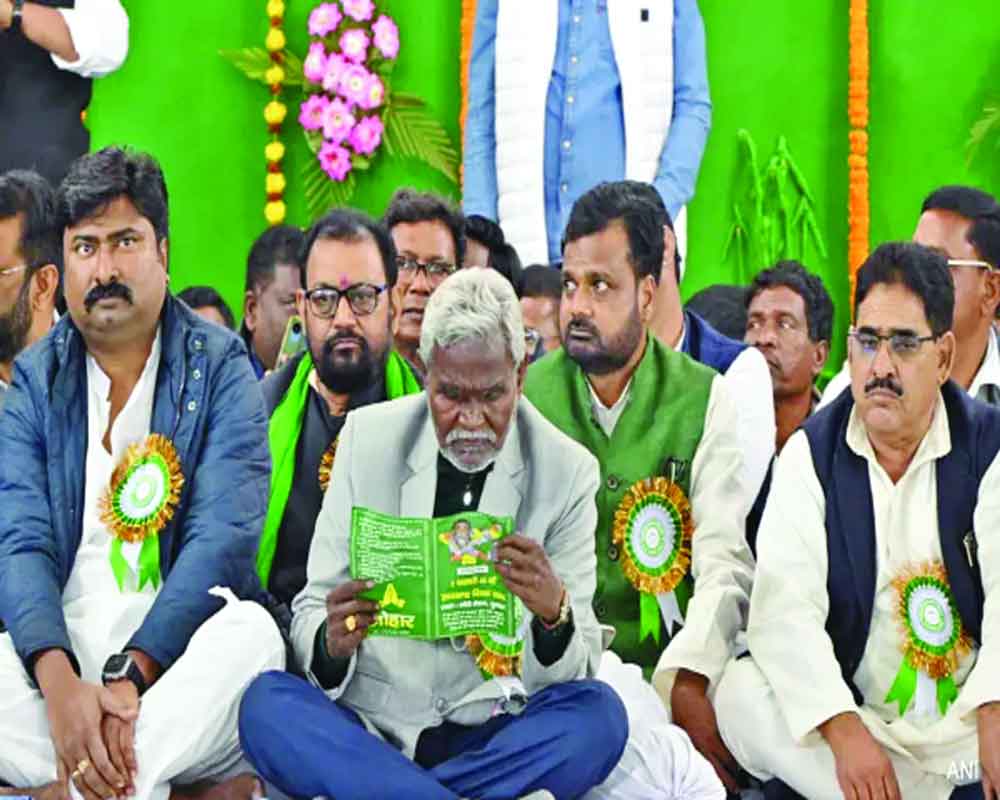Jharkhand has been going through political unrest since it was carved out in 2000. Therefore, it is no surprise that it is facing yet another crisis now
The State had a tumultuous political history. It has witnessed eleven chief ministers in the last two decades, with the twelfth appointment being Champai Soren; on Friday, Hemant Soren, the previous chief minister, was interrogated for seven hours at his official residence and was subsequently forced to resign, resulting in a crisis. Corruption and defection have led to instability in the State. In the past, several former Chief Ministers resigned due to corrosion. It was not surprising when Hemant Soren was arrested, as he knew it was coming sooner or later.
Unfortunately, the crisis occurred at a crucial time, raising several issues. These include the uncertainty surrounding the newly formed Opposition Forum INDIA. It could adversely the outcome of the 2024 elections, which are scheduled for April-May. Additionally, why small states are experiencing political instability should also be investigated.
Jharkhand has had political instability and Maoist violence since it was formed. In contrast, Chattisgarh, created simultaneously, has been relatively politically stable. Jharkhand is blessed with plenty of natural resources. Still, its people have been struggling with poverty and underdevelopment due to frequent changes in governance. This has caused problems for the State's development over time. Jharkhand has had 11 Chief Ministers since 2000, with most having brief tenures. Only Raghubar Das, a member of the Bharatiya Janata Party (BJP), completed a full five-year term from 2014 to 2019.
After Hemant Soren resigned, Governor CP Radhakrishnan delayed Champai Soren's swearing-in ceremony, causing tensions in Jharkhand. The State was left without a Chief Minister for more than 48 hours. However, Champai Soren, a committed Jharkhand Mukti Morcha party member and the former State Transport Minister, was finally sworn in as the new Chief Minister on Friday. Champai Soren is one of the party's founding members, along with Hemant Soren's father, Shibu Soren. Hemant chose Champai Soren as his successor not only for his loyalty but also for his competence and dedication to the party.
Just forming smaller states is no guarantee for better lives, as evidenced by Uttarakhand, Chhattisgarh, and Jharkhand, all created in 2000. The Jharkhand Assembly has 81 members. A government can form with 41 members. The JMM-Congress-RJD alliance has 47 members, BJP. has 25, and AJSU. has three members. The remaining seats are shared by the NCP, a Left party, and three independent members.s.
The JMM-led alliance was concerned about the Bharatiya Janata Party destabilizing their government by luring their members away. As a precaution, the MLAs were taken to a safe place until the new chief minister took the oath. Defection problems have plagued the political system; resort politics is another issue that needs attention.
The opposition coalition INDIA has faced a setback after instability in Jharkhand. The cracks in the alliance have become more evident due to a lack of unity within INDIA. group. Nitish Kumar's departure from the party, followed by Mamata Banerjee's announcement that her TMC. the party will contest in all seats in West Bengal, and AAP's decision to run independently in Punjab has posed a severe threat to the unity of the group. The strained relationship between the Congress and Akhilesh Yadav's SP in Uttar Pradesh has further worsened the situation.
The Opposition accuses the Modi government of investigating several leaders from the Opposition. These include Delhi's CM Arvind Kejriwal, Kerala's Pinarayi Vijayan, NCP's Sharad Pawar, Hemant Soren, DMK's Stalin and the Congress. Former Prime Minister Atal Bihari Vajpayee established three smaller states by dividing larger ones: Chhattisgarh from Madhya Pradesh, Jharkhand from Bihar, and Uttarakhand from Uttar Pradesh. The main goal was to promote development in these regions.
However, two decades later, these states are still experiencing instability and a lack of development. The mere creation of a smaller state is no guarantee for better lives. The time has come to assess whether smaller states have achieved their intended purpose. There may be better options for the people. Smaller assemblies can cause instability as MLAs switch sides. In smaller states, elections often prioritize local issues, dividing representation among smaller parties and regional leaders who act independently. It can have unintended consequences that negatively affect people's lives. The stability of smaller states depends on various factors. In Chhattisgarh, Uttarakhand, direct contests occur between BJP and Congress. But, in Jharkhand, the multi-party system with national parties relying on regional parties can lead to instability and defections.
In elections, when no political party wins a clear majority, it can cause political instability in small and large states. To prevent lawmakers from switching parties, the Anti-Defection Law was created. However, this law often fails as some legislators are tempted by money and muscle power. Comprehensive electoral reforms should be implemented, and state funding must be provided for elections. Political parties must find practical solutions to ensure the system's fairness and transparency.
(The writer is a popular columnist; views are personal)


























